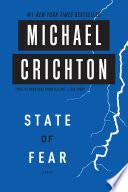“Do you know what we call opinion in the absence of evidence? We call it prejudice.”
Source: State of Fear

State of Fear is a 2004 techno-thriller novel by Michael Crichton, in which eco-terrorists plot mass murder to publicize the danger of global warming. Despite being a work of fiction, the book contains many graphs and footnotes, two appendices, and a 20-page bibliography in support of Crichton's beliefs about global warming. Many climate scientists, science journalists, environmental groups, and science advocacy organisations dispute Crichton's views on the science as being error-filled and distorted.The novel had an initial print run of 1.5 million copies and reached the #1 bestseller position at Amazon and #2 on The New York Times Best Seller list for one week in January 2005. The novel itself has garnered mixed reviews, with some literary reviewers stating that the book's presentation of facts and stance on the global warming debate detracted from the book's plot.
“Do you know what we call opinion in the absence of evidence? We call it prejudice.”
Source: State of Fear
“I think that you cannot eliminate religion from the psyche of mankind.”
State of Fear (2004)
Context: I think that you cannot eliminate religion from the psyche of mankind. If you suppress it in one form, it merely emerges in another form. Even if you don't believe in God, you still have to believe in something that gives meaning to your life, and shapes your sense of the world. Such a belief is religious.
State of Fear (2004)
Context: I think that you cannot eliminate religion from the psyche of mankind. If you suppress it in one form, it merely emerges in another form. Even if you don't believe in God, you still have to believe in something that gives meaning to your life, and shapes your sense of the world. Such a belief is religious.
“Endless presentation of conflict may interfere with genuine issue resolution.”
State of Fear (2004)
Context: Endless presentation of conflict may interfere with genuine issue resolution. There is evidence that the television food-fights not only don't represent the views of most people — who are not so polarized — but may tend to make resolution of actual disputes more difficult in the real world. At the very least, they obscure the recognition that we resolve disputes every day.